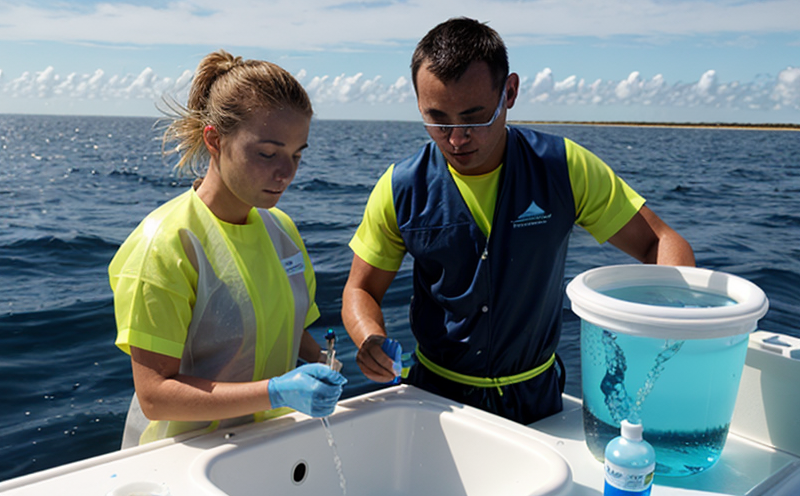ASTM D4012 Cyanide Test in Seawater
The ASTM D4012 method is a standardized approach to quantifying cyanide levels in seawater, which is essential for ensuring compliance with environmental regulations and safeguarding marine ecosystems. Cyanide can pose significant risks to both aquatic life and human health, particularly when present at elevated concentrations. This test is critical for industries operating near coastal areas, such as mining, metal processing, and chemical manufacturing.
The ASTM D4012 procedure involves the use of a specific reagent that reacts with cyanide ions in the sample to form a complex that can be detected spectrophotometrically. The method specifies precise conditions for sample preparation, including dilution ratios and incubation times, which are crucial for obtaining accurate results.
Sample collection is critical; seawater samples should be collected at specific depths and locations to ensure representativeness of the water body being analyzed. Proper preservation methods must also be followed to minimize degradation or alteration of cyanide compounds before analysis can occur.
The ASTM D4012 method ensures consistent, reliable results by providing detailed procedural steps that laboratory technicians follow strictly during testing. Compliance with this standard guarantees accurate measurements and adherence to international best practices for environmental monitoring.
Understanding the nuances of this test is vital for those responsible for water quality management in coastal regions or involved in projects that may impact marine environments. By mastering ASTM D4012, stakeholders can make informed decisions about how to manage cyanide levels effectively, thereby protecting both the environment and public health.
The significance of the ASTM D4012 method extends beyond mere compliance; it plays a pivotal role in preserving marine biodiversity and supporting sustainable development goals. Regular monitoring through this standardized technique allows for early detection of potential issues and timely interventions to mitigate environmental damage caused by cyanide contamination.
- Competitive Advantage: Compliance with ASTM D4012 enhances an organization's reputation as a leader in environmental stewardship, fostering trust among stakeholders. It also provides peace of mind regarding regulatory compliance and potential legal liabilities associated with non-compliance.
- Sustainable Development: By accurately measuring cyanide levels in seawater, organizations contribute to the protection of marine ecosystems, which supports broader sustainability objectives.
Benefits
The ASTM D4012 Cyanide Test offers numerous advantages for industries and environmental agencies that require precise cyanide measurements. Firstly, it ensures consistent and reliable results across different laboratories and testing facilities, enhancing the credibility of analytical data. Secondly, compliance with this standard helps in identifying potential sources of cyanide pollution early on, allowing for proactive measures to be implemented before significant harm occurs.
Additionally, by adhering to ASTM D4012 guidelines, organizations demonstrate their commitment to environmental responsibility and regulatory adherence, which can positively influence stakeholder relationships. This transparency fosters trust between industry players and the communities they serve, leading to better public perception and support for sustainable practices.
The test also facilitates effective communication among various stakeholders involved in managing water quality issues, ensuring that all parties are on the same page regarding cyanide levels and necessary actions. With accurate data provided by ASTM D4012 testing, decisions made about corrective measures or preventive strategies can be more informed and targeted towards specific areas of concern.
Moreover, regular monitoring through this standardized technique enables continuous improvement in environmental management practices, contributing to long-term sustainability efforts aimed at preserving marine biodiversity. Overall, the benefits of implementing ASTM D4012 extend far beyond mere compliance—it represents a proactive approach to safeguarding our oceans and ensuring their health for future generations.
Environmental and Sustainability Contributions
The ASTM D4012 Cyanide Test significantly contributes to environmental protection and sustainability initiatives by providing accurate measurements of cyanide levels in seawater. Accurate monitoring is crucial because even trace amounts of cyanide can have detrimental effects on marine life, leading to disruptions in ecosystems and potential threats to human health.
By conducting regular tests according to ASTM D4012 guidelines, organizations can identify areas where immediate action is needed to prevent further contamination or degradation. This proactive approach not only helps maintain healthy oceans but also supports broader sustainability goals such as reducing pollution and promoting biodiversity.
The test results generated from this method aid in tracking progress over time, allowing stakeholders to assess the effectiveness of implemented mitigation strategies. It provides valuable insights into the impact of various activities on water quality, enabling informed decision-making processes for better resource management practices.
Furthermore, compliance with ASTM D4012 fosters collaboration among different sectors involved in managing coastal environments, including government agencies, private companies, and non-profit organizations working towards common objectives. Such cooperation enhances overall efforts directed toward preserving marine ecosystems while meeting regulatory requirements set forth by international standards like ISO, EN, and IEC.
Competitive Advantage and Market Impact
- Reputation for Environmental Responsibility: Organizations that consistently adhere to ASTM D4012 guidelines establish themselves as industry leaders committed to environmental stewardship. This reputation enhances their standing among customers, investors, and other stakeholders.
- Reduced Risk of Legal Penalties: By ensuring accurate cyanide measurements through this standardized method, companies reduce the likelihood of violating regulations related to water quality standards, thus avoiding potential fines or legal actions.
- Enhanced Stakeholder Trust: Demonstrating adherence to recognized international standards like ASTM D4012 builds trust with local communities and regulatory bodies. This increased trust can lead to stronger relationships that benefit both short-term business operations and long-term strategic goals.
- Innovation Opportunities: Understanding cyanide concentrations in seawater through reliable testing opens up possibilities for developing new technologies or processes aimed at reducing pollution sources or improving treatment methods.
The ASTM D4012 Cyanide Test plays a vital role in maintaining the integrity of global water resources, particularly those used by coastal communities. Its implementation ensures that industries and environmental agencies can effectively manage cyanide levels, promoting healthier oceans and supporting sustainable development goals worldwide.





